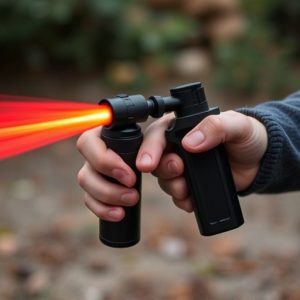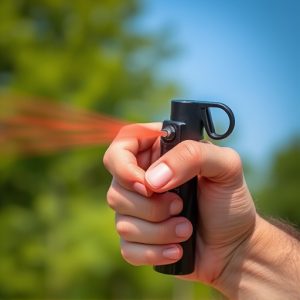Storing Pepper Spray at Home: Safety, Legalities, and Effective Use
Capsicum-based personal protection sprays, commonly known as pepper spray, use capsaicin to temporar…….
Capsicum-based personal protection sprays, commonly known as pepper spray, use capsaicin to temporarily incapacitate attackers. For effective and safe home storage, keep them in cool, dry places, away from children, pets, direct sunlight, heat sources, and temperature fluctuations. Comply with local regulations regarding location, quantity, and labeling. Practice proper application techniques: assess surroundings, aim at face, eyes, nose from an arm's length, activate firmly, and move quickly while spraying continuously. Regularly inspect for damage, leakage, expiration date, and changes in scent or consistency.
“Discover the power of self-defense with capsicum-based personal protection sprays. This comprehensive guide explores every aspect, from understanding the active ingredient, capsaicin, and its effectiveness against potential threats, to practical tips on storage and application. Learn the legal aspects of owning pepper spray in your region and essential best practices for keeping it secure at home. Enhance your knowledge on maintaining optimal conditions to ensure its longevity.”
- Understanding Capsicum-Based Pepper Spray: Composition and Effectiveness
- Storing Pepper Spray Safely at Home: Tips and Best Practices
- Legal Considerations: Pepper Spray Ownership and Regulations
- Application Techniques: How to Use Your Pepper Spray Effectively
- Maintenance and Lifespan: Ensuring Your Pepper Spray Remains Viable
Understanding Capsicum-Based Pepper Spray: Composition and Effectiveness
Capsicum-based personal protection sprays, also known as pepper spray, are designed to incapacitate an attacker and provide time for escape or assistance. The primary active ingredient is capsaicin, a natural chemical derived from chili peppers. This compound stimulates nerve endings in the eyes, nose, and throat, causing intense irritation, temporary blindness, and difficulty breathing. The composition typically includes other ingredients like water, alcohol, and thickening agents to ensure even distribution when sprayed.
These sprays are highly effective as self-defense tools due to their fast-acting properties. A single spray can disable an assailant for several minutes, offering the user valuable time to retreat or call for help. When storing pepper spray at home, it’s crucial to keep it in a secure, cool, dry place out of reach of children and unauthorized individuals. Proper storage is essential to maintain the spray’s effectiveness, as extreme temperatures and humidity can degrade its performance over time.
Storing Pepper Spray Safely at Home: Tips and Best Practices
Storing pepper spray at home is a crucial step in ensuring its effectiveness and safety. Keep it out of reach of children and pets, much like any other hazardous household item. A locked cabinet or high shelf is ideal for storage, away from direct sunlight and heat sources. It’s also recommended to store the spray in its original packaging with clear instructions visible. Regularly check the expiration date and ensure the nozzle isn’t blocked to maintain optimal performance.
When not in use, keep pepper spray in a cool, dry place. Avoid storing it near cooking or heating areas as extreme temperatures can affect its potency. Additionally, never leave the spray unattended in vehicles, as temperature fluctuations inside cars can compromise its integrity. Always store spare units or refills separately and securely to prevent accidental deployment.
Legal Considerations: Pepper Spray Ownership and Regulations
The ownership and use of pepper spray for personal protection are governed by strict legal regulations, which vary significantly from one jurisdiction to another. In many regions, civilians are permitted to own and carry pepper spray as a means of self-defense, especially when traveling or in areas with high crime rates. However, there are specific laws and guidelines regarding the type, quantity, and storage of these self-defense tools.
When storing pepper spray at home, it’s crucial to familiarize yourself with local regulations. Each country or state may have its own restrictions on where and how you can keep pepper spray. Typically, it’s recommended to store it in a secure, locked location, out of reach of children and unauthorized individuals. Ensure the container is clearly labeled and that you understand the expiration date and safety instructions provided by the manufacturer. Adhering to these legal considerations will help ensure your right to personal protection while avoiding any potential legal complications.
Application Techniques: How to Use Your Pepper Spray Effectively
Application Techniques: Utilizing Your Pepper Spray Effectively
When using a capsicum-based personal protection spray, proper application is key to ensuring its effectiveness. Start by assessing your surroundings and identifying potential threats. Hold the spray at arm’s length, aiming directly at the attacker’s face, eyes, and nose. This targeted approach maximizes impact. Activate the spray by firmly pressing the nozzle, releasing a stream or burst of the irritant. Move quickly towards your assailant while continuously spraying to create a barrier between you and them.
Remember, practice makes perfect. Rehearse different scenarios in safe environments to familiarize yourself with the spray’s range and duration. Proper storage is equally important for maintaining the spray’s potency. Keep it out of reach of children and pets, away from direct sunlight, and in a cool, dry place. Storing your pepper spray at home in a secure location ensures its readiness when you need it most.
Maintenance and Lifespan: Ensuring Your Pepper Spray Remains Viable
Proper storage is key to maintaining the effectiveness and lifespan of your pepper spray. It’s recommended to keep it in a cool, dry place away from direct sunlight or extreme heat. A pantry, medicine cabinet, or even a locked drawer can serve as suitable locations. Ensure that the area has consistent temperature and humidity levels; fluctuations can degrade the spray’s potency over time. Avoid storing it near food items to prevent accidental exposure. Additionally, keep it out of reach of children and pets for safety purposes.
Regularly inspect your pepper spray for any signs of damage or leakage. Check the expiration date or lot number to ensure it remains within its viable period. If you notice any changes in scent or consistency, or if the nozzle is blocked, it’s time to replace it. Following these storage guidelines will help extend the shelf life of your pepper spray and guarantee its readiness when needed.
Capsicum-based personal protection spray offers a powerful yet non-lethal self-defense option. By understanding its composition, storage best practices, and legal considerations, users can ensure their safety and peace of mind. Proper application techniques and regular maintenance are key to maximizing its effectiveness. Remember, storing pepper spray at home responsibly is crucial for both your security and the well-being of your family.


